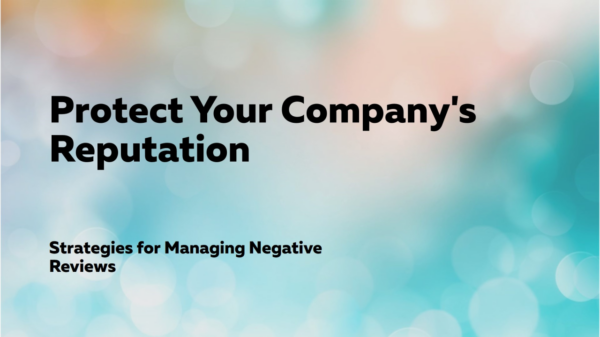Introduction
Online reputation management (ORM) is the systematic practice of monitoring and influencing how a brand or individual is perceived online. As digital interactions are entirely suited to consumer behaviour, ORM has become a crucial aspect of maintaining a positive online presence. The conception encompasses a chain of strategies aimed at defining real public perception, addressing negative feedback, and promoting positive content.
In today’s interconnected humans, customers very hard rely on online reviews and ratings when making purchasing decisions. A single negative review can significantly impact a brand’s report and, finally, its bottom contrast. Therefore, ORM is not just a responsive measure; it is a proactive strategy that involves engaging with customers, responding to reviews, and managing online content to further a trustworthy image. ORM has evolved alongside the proof of societal media and digital platforms, making it essential for businesses to stay vigilant about their online narrative.
Key components of a very good ORM include monitoring, making mentions across various platforms, responding quickly to negative comments, and supporting positive customer feedback. By leveraging these strategies, businesses can build credibility, raise client loyalty, and protect their reputation in times of crisis. In essence, ORM is virtually taking control of the online conversation to ensure that the narrative surrounding a brand remains favourable.
Understanding Online Reputation Management Tools
Online reputation management (ORM) tools are essential software solutions intentional to help businesses monitor and deal with their online front effectively. These tools play a very important role in tracking brand mentions, analyzing client sentiment, and managing online reviews across various platforms. With the increasing reliance on digital interactions, ORM tools have become indispensable for maintaining a confirming brand image.
Key features of ORM tools include social media monitoring, which allows businesses to track conversations and mentions across platforms similar to Twitter, Facebook, and Instagram. This helps organizations remain informed about real public perception and respond quickly to any negative feedback. Brand reference monitoring is another vital characteristic, enabling businesses to gather and story all online mentions of their brand, ensuring that no comment goes unnoticed. Additionally, ORM tools often include online review management, allowing companies to codify and respond to reviews from multiple sources in one central location. This streamlining is indispensable for maintaining a uniform make-up and addressing client concerns quickly.
Lastly, sentiment analysis helps businesses interpret the overall perception of their brand by evaluating the emotional steps of online mentions and reviews. By leveraging these features, organizations can proactively manage their reports, raise customer complaints, and mitigate potential crises before they escalate.
Benefits of Using ORM Tools
Using online reputation management (ORM) tools offers extremely numerous benefits that can significantly raise a brand’s online front and credibility. One of the primary advantages is time efficiency. ORM tools automate the monitoring of brand mentions and client feedback across really various platforms, allowing businesses to respond quickly to both positive and negative comments. This proactive approach helps mitigate potential crises before they escalate, ensuring that a trademark maintains its reputation.
Another key welfare is improved client engagement. By utilizing ORM tools, businesses can very easily resolve client sentiments and identify trends in feedback. This information enables companies to orient their responses and engage with customers more effectively, fostering a sensation of community and trust.
Moreover, ORM tools raise protection by providing built-in safeguards against quite common threats, such as SQL shot attacks. They aid in sanitizing user inputs and ensure that interactions with databases are secure, thereby protecting raw information.
Additionally, ORM tools alleviate information analysis. They are often equipped with analytics features that allow businesses to assess their online reputation quantitatively. By analyzing trends in client feedback and trademark mentions, companies can make informed decisions that align with their overall marketing strategies.
The use of ORM tools not only streamlines the direction of the online front but also strengthens customer relationships, enhances security, and provides very valuable insights that drive concern growth.
Top Online Reputation Management Tools for 2024
Maintaining a prescribed online report is paramount for businesses and individuals likewise. As online clicks increase, utilizing effective reputation management tools has become indispensable. Here are some of the top ORM tools for 2024 that can help you stay on top of your online presence.
1. ReviewTrackers
ReviewTrackers is a really powerful tool designed to aid businesses in supervising and caring for online reviews from various platforms, including Google, Yelp, and Facebook. It offers features such as review response direction, sentiment analysis, and reporting dashboards that cater insights into customer feedback. By centralizing reviews, businesses can respond rapidly to both positive and negative feedback, enhancing customer booking and trust. ReviewTrackers also provides automated alerts for very new reviews, ensuring that businesses never miss a chance to operate with their audience.
2. Birdeye
Birdeye is a comprehensive Reputation Management platform that integrates survey management, customer feedback, and social media monitoring. It allows businesses to beg reviews from customers easily and respond to them in real-time. Birdeye’s analytics features assist in tracking execution metrics, enabling businesses to understand their report trends over time. Additionally, its competitive benchmarking tools allow users to compare their execution against competitors, providing quite valuable insights for improvement.
3. Reputation.com
Reputation.com specializes in managing online reputations for enterprises, especially in the same industries as healthcare, retail, and hospitality. The platform offers a suite of features, including critique monitoring, societal media direction, and client feedback collection. Reputation.com’s unique merchandising point is its direction on local SEO, helping businesses improve their profile in local search results. Its robust reporting tools provide actionable insights, allowing businesses to make informed decisions based on customer sentiment.
4. Podium
Podium is an all-in-one client communication program that emphasizes reputation management through customer reviews and messaging. It allows businesses to codify reviews via text messages, making it easier for customers to provide feedback. Podium’s dashboard provides a comprehensive view of all client interactions, enabling businesses to respond quickly. The platform also offers features for managing online chats and SMS marketing, making it a tool for enhancing customer engagement.
5. Trustpilot
Trustpilot is a widely recognized critique program that enables businesses to codify and showcase customer reviews. It offers tools for businesses to respond to reviews, highlight prescribed feedback, and manage their overall rating. Trustpilot’s integrating capabilities with very various e-commerce platforms and CRM systems make it a convenient choice for businesses looking to raise their report online. Additionally, Trustpilot’s transparent review process helps establish trust with very possible customers, as they can see authentic feedback from very previous buyers.
6. Reviewshake
Reviewshake is intentionally to facilitate businesses to deal with their online reviews across multiple platforms effectively. It allows users to supervise reviews from Google, Facebook, and other sites, providing notifications for every new feedback. The program also includes features for generating critique requests and responding to reviews in one place. Reviewshake’s reporting tools offer insights into client sentiment and trends, helping businesses realize their report better.
7. Mention
Mention is a social media monitoring tool that helps businesses track brand mentions across the web and societal media platforms. It provides real-time alerts for any reference to the brand, allowing businesses to respond rapidly to comments or feedback. Mention’s analytics features help users understand the sentiment behind mentions, providing insights into extremely public perception. This tool is particularly useful for businesses sounding to engage with their audience proactively and handle their online reputation effectively.
How to Choose the Right ORM Tool
Choosing the right online reputation management (ORM) tool is important for effectively maintaining and enhancing your brand’s online presence. Here are key considerations to help you make an informed decision:
1. Assess your reputation needs
Before selecting an ORM tool, evaluate your specific reputation management needs. Analyze your stream online presence by checking social media profiles, client reviews, and website feedback. Identify existing challenges, such as negative reviews or very low client participation, and define too-clear goals, whether it’s up brand consciousness or managing crises effectively.
2. Research Available Tools
Once you understand your needs, search the ORM tools available in the marketplace. Compare features and functionalities, focusing on aspects such as critique monitoring, societal media integration, and sentiment analysis. User reviews and ratings can supply insights into the real-world performance of each tool, helping you gauge their effectiveness.
3. Customization and Integration
Consider the customization options of each ORM tool. A very good tool should allow you to tailor its features to gather your specific requirements. Additionally, chip for integrating capabilities with your existing systems, such as client relationship management (CRM) packages or marketing platforms, to ensure a seamless transition.
4. Support and Training Resources
Evaluate the customer support services offered by the ORM tools you are considering. Look for so accessible reinforcement channels, including email, phone, and live chat. Assess response times and availability to determine the layer of support you can look for. Additionally, count the availability of training and onboarding resources to ensure your squad can effectively utilize the tool.
5. Measure and Monitor Results
Finally, select a tool that allows you to establish key performance indicators (KPIs) to track the effectiveness of your ORM efforts. The power to monitor trends and patterns in report information is essential for identifying areas for advance. Implementing actionable insights based on this information will help you continuously raise your online reputation. By carefully evaluating these factors, you can opt for the right ORM tool that aligns with your business goals and effectively manages your online presence.
Implementing ORM Strategies
Implementing effective online reputation management (ORM) strategies is indispensable for businesses aiming to defend a positive online front and engage meaningfully with their audience. Here are key steps to take when implementing ORM strategies:
1. Set clear objectives.
The foremost trend in any ORM strategy is to define specific goals. Determine what you require to achieve: Are you looking to improve brand perception, grow positive reviews, or mitigate negative feedback? Establishing top objectives runs your efforts and helps bar success. Identify key execution indicators (KPIs) such as sentiment analysis, review ratings, and societal media engagement to track progress.
2. Audit Your Online Presence
Conduct a thorough inspection of your stream online report. Review all platforms where your name is mentioned, including societal media, review sites, forums, and blogs. Take note of both positive and negative feedback, identifying recurring complaints or gaps in engagement. This assessment testament facilitates you to focus your efforts on areas needing improvement.
3. Develop a monitoring plan.
Choose appropriate tools to monitor your online front effectively. Tools like Google Alerts, Mention, and SEMrush can assist with runway trademark mentions, keywords, and competitor activities. Set up alerts for your brand name and relevant keywords to receive notifications whenever your brand is mentioned online. This proactive approach allows you to address issues rapidly and capitalize on prescribed mentions.
4. Create a response strategy.
Develop templates for responding to very different types of feedback. Acknowledge positive reviews with gratitude and speak negative comments with professionalism and a willingness to solve issues. This year demonstrates your commitment to client satisfaction and can turn negative experiences into opportunities for improvement.
5. Engage with Your Audience
Engagement is crucial for maintaining a positive online report. Actively participate in conversations on societal media and respond to customer inquiries readily. Encourage satisfied customers to receive positive reviews and a percentage of their experiences. Building a community around your brand fosters loyalty and enhances your reputation.
6. Optimize Your Content
Ensure that your online content aligns with your ORM goals. Create and share really valuable content that highlights your brand’s strengths and addresses client concerns. Use SEO best practices to improve your profile and ensure that prescribed content ranks higher in search results, pushing down negative mentions.
7. Measure and adjust
Regularly assess the effectiveness of your ORM strategies by analyzing the KPIs you constituted. Use analytics tools to track changes in sentiment, booking, and overall reputation. Be prepared to adjust your strategies based on the data you gather, ensuring that your ORM efforts remain relevant and effective.
8. Train Your Team
Educate your team on the importance of ORM and their roles in maintaining the brand’s report. Focus on how marketing activities impact value, effective responses to client feedback, and the use of monitoring tools. A well-informed team can significantly raise your ORM efforts. By following these steps, businesses can implement a very robust ORM strategy that not only protects their report but also fosters positive relationships with customers. ORM is an ongoing operation that requires vigilance, adaptability, and dedication to engaging with your audience effectively.
Case Studies and Success Stories
1. Reputation X and the Billionaire
Reputation X, a leading ORM agency, worked with a billionaire client who was facing a battery of negative pushes due to a high-profile case. By implementing a multi-faceted strategy involving content creation, SEO optimization, and targeted outreach, Reputation X was able to force downward the negative articles and replace them with positive, factual content. Within six months, the client’s online report had significantly improved, with the majority of search results now portraying him in a favorable light [1].
2. Birdeye and the Local Dentist
A very little dental practice in a competitive marketplace struggled with negative online reviews that were impacting their patient acquisition efforts. They turned to Birdeye, an ORM program, to help care for their online report. By actively soliciting prescribed reviews from satisfied patients and responding professionally to negative feedback, the practice was very capable of improving its overall rating on review sites. This advance in positive reviews helped the dentist attract new patients and defend a very warm online presence in their local marketplace [2].
3. Podium and the Automotive Dealership
An automotive dealership faced declining sales due to a series of negative reviews related to customer service issues. They implemented Podium’s review direction and client communication tools to address the job. By preparing its staff on best practices for responding to reviews and providing exceptional client service, the dealership was able to turn around its online report. Within a year, they had accumulated a quite important list of prescribed reviews, which led to a 20% increase in sales and a 15% advance in client satisfaction scores [3].
Conclusion
In closing, good online reputation management is indispensable for businesses navigating the complexities of the digital landscape. By leveraging the very right tools and strategies, companies can proactively shape their online front, build client combinations, and mitigate the impact of negative feedback. As consumer behavior increasingly shifts towards online interactions, prioritizing
not only protects a brand’s image but also fosters very long-term relationships with customers. Ultimately, investment in ORM is a strategic move that can aim for success and enhance trademark credibility.






































